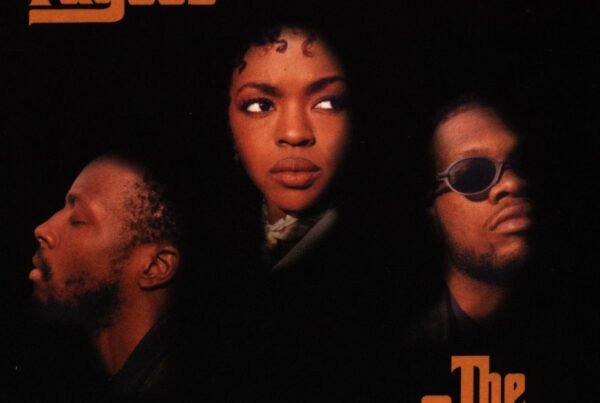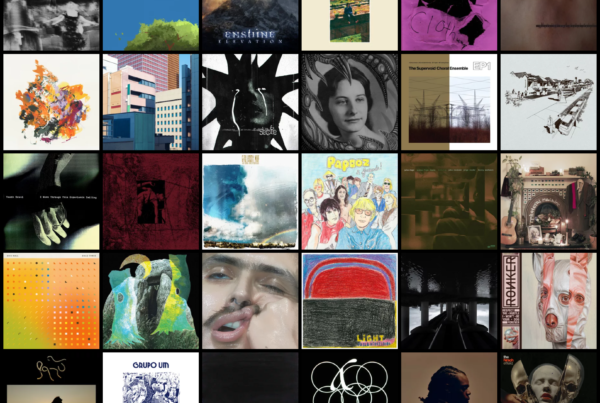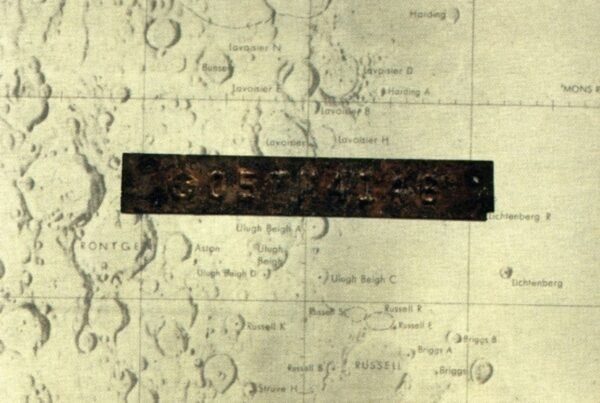‘If you polled the legions of fans, I’d hazard a guess that Symbolic would be one of the most common answers. And here in its thirtieth year, it’s not hard to see why!‘

Release date: March 21, 1995 | Roadrunner Records | Bandcamp | Facebook | Instagram | Website
Not many bands get to pioneer a whole damn subgenre only to turn around and set compositional standards for it that are so lofty that they spawn two entire offshoots of the style they originally invented. Death were, quite literally, built different, as they defined an entire era thanks to Chuck Schuldiner’s impeccable and technically demanding songwriting. Symbolic stands as one of their career highlights amongst a frankly frightening reel of hits.
Iain Ferguson
It’s cliche to say that a band needs no introduction, but let’s be real; if you know death metal, you know Death. Even if you haven’t taken the time to run through their discography (and why not?), you’re aware that every other band in the style beyond some fellow originators owes a massive debt to Chuck Schuldiner and his myriad cohorts. From establishing the genre writ large on Scream Bloody Gore to the long progressive corridors of The Sound of Perseverance, Death staked out an evolutionary career to serve as guiding light for all varieties of death metal groups. The influence is undeniable, but it begs the question of what the best Death album actually is.
If you polled the legions of fans, I’d hazard a guess that Symbolic would be one of the most common answers. And here in its thirtieth year, it’s not hard to see why! By 1995, death metal had outclassed the earliest Death albums in sheer barbarity and heaviness (though not often in quality, especially in Leprosy‘s case). But Death hadn’t stuck around to notice that. Since 1991’s Human, Schuldiner was striving for a more thoughtful, progressive approach to extreme metal akin to likeminded adventurers such as Atheist, Pestilence, or Cynic (the latter even featuring Death alumni).
Symbolic stands as the peak of Death‘s progressive mindset while you could still arguably call them a death metal band, a fact that wasn’t lost on Schuldiner when he requested his label not to market it as such. The riffs were still crushingly heavy when necessary, but zippier, thrashy melodic lines were often darting across the top of the mix. Cleaner guitars and more atmospheric soft breaks abound, as did more deliberate tempos. The more long-winded songwriting relied less on verse and chorus and more on a steady stream of ideas circling around on themselves. And Schuldiner had abandoned the gory prose of his earlier works for more thoughtful observations on society (“1000 Eyes”), interpersonal relationships (“Empty Words”), and faith (“Crystal Mountain”), delivered in more intelligible, higher pitched tones. Symbolic, far from being a mere entertaining bludgeoning, dared listeners to think and to feel in ways not common in extreme metal.
Vitally, it’s a deeply approachable album by genre standards, and leaves plenty for listeners to ponder both in word and music. It helps that some of the songs are among the finest Death has ever composed. “Crystal Mountain”, with its snappy riff, moodier breaks, and slick acoustic fadeout solo is a fan-favorite for damn good reason. “Symbolic” likewise kicks the album off in stellar, labyrinthine form, while deeper cuts like “Misanthrope” and “Without Judgement” are honed to fine points. I’ve always loved “Empty Words” for its atmosphere personally, while my recent revisit highlighted the bass-heavy “Sacred Serenity” as another personal standout.
It’s almost funny to think of this as being the album where Schuldiner stopped trying to pull in big names for a backing band (besides the outstanding drums of Gene Hoglan). But that it was, and to their credit Bobby Koelble and Kelly Conlon did a tremendous job filling in on guitar and bass respectively. Hell, even in the shadow of replacing Steve DiGiorgio, Conlon provides a rock-solid bass foundation, while Koelble handily faces everything Schuldiner can throw at him with aplomb.
All that being said, I’ve always had a bit of a weird relation to Symbolic. For all its undeniable quality and for being the first Death album I heard, it tends to be the one I revisit least. It doesn’t provide the same oomph as previous albums (I’m a Leprosy fanboy, after all), and I never really liked Schuldiner’s higher pitched vocal approach all that much. The songwriting, for as ambitious and complex as the music is, does feel a little formulaic with most songs consisting of a main body of 3 or 4 ideas, an extended bridge, and the initial main body repeated. And something about “Perennial Quest” does always lose me somewhere within its protracted runtime.
But the Death fandom doesn’t need my little gripes. Symbolic is beloved, an absolute milestone in progressive death metal. And it marked Schuldiner’s final bow in death metal before the proggier The Sound of Perseverance, the more power metal approach of follow-up band Control Denied (which, coincidentally, I adore), and ultimately his tragic passing to pneumonia while battling cancer in 2001. It may not be my own favorite Death album, but thousands have found inspirations in its complex musicality and pensive lyricism, be it any number of bands still writing and performing to this day or that random metalhead you walked by at the grocery store. Symbolic stands the test of time, and I doubt it or the band that birthed it will be forgotten anytime soon.
Joe McKenna
When you ask the questions ‘who started death metal?‘, ‘how did extreme metal become so compositionally dense and technical?‘, ‘who was the first to bring exclusively harsh vocals to songwriting?‘, a lot of the time the answer is going to be Death. For a band that is frequently credited as one, if not the pioneering death metal bands out of the Tampa, Florida scene, Death didn’t just define death metal through Chuck Schuldiner’s amazingly technically gifted and incredibly aggressive approach to heavy metal songwriting, they set the bar so high before others could even begin to catch up. The fact that I had to write a piece on only one aspect of Death’s iconic and untouchable discography was such a difficult one to take as it should be acknowledged that none of the band’s albums could be deemed anything lower than an 8 or 9 out of 10, and that’s if you really want to be a critic of their work. Yet when given the opportunity to truly explore one of Death’s album’s in-depth you can really notice the intricacies and technical nuances within the songwriting and performance that made Chuck Schuldiner a master of his craft.
Symbolic to me is one of the greatest achievements in the realm of extreme metal. The abhorrent execution of each riff and the way in which they can seamlessly blend together demonstrates some of the best songwriting in metal as a whole. From the opening riff on the title track, Schuldiner was able to pull you in with force and allow you to follow the music, as complex as it might be, with anticipation and excitement. The technicality doesn’t falter either, and I think that is certainly down the musicians that Schuldiner recruited to maintain a high standard of songwriting craft. Legendary death metal drummer Gene Hoglan unleashes intense, speed-inflicting percussion to such high accuracy, with a personal stand out being his blast-beat inclusion on the penultimate track “Misanthrope”. The accompanying guitar melodies from Bobby Koebel add an extra layer of intricacy along Chuck’s own lines and really amplify the technical prowess (check out the mid-section harmonies of “1000 Eyes”).
Something I’ve also always appreciated about Death was how every sonic aspect holds up to the same standard, and that’s so true when listening to some of the audible basslines too. Kelly Conlon’s fast, dexterous bass fills can be heard quite prominently on “Sacred Serenity” and “Perennial Quest”, and they contain some of the record’s most heavily articulated rhythmic moments. However, arguably the record’s magnum opus that ties all these elements together masterfully has to be “Crystal Mountain”. I remember hearing this song and being overwhelmed by the track’s layers of consistency, complexity, and sonic hybridisation, utilising multiple dynamic shifts and an awesome Spanish-style guitar outro.
Another reason why I think this record resonates so deeply is how its emphasis on melody made me appreciate where the influence of many melodeath bands I was listening to at the time (Bodom, Amon Amarth, In Flames etc.) had stemmed from. Listening to the opening of “Empty Words” and “Without Judgement”, you get a glimpse into the way this band could demonstrate an aura of harmony whilst maintaining that notion of sheer brutality. It’s utterly intriguing how Death could manage to keep this level of extremity throughout the band’s extensive career and yet there’s always been a gesture of accessibility to their sound, a credit to the songwriting excellence of Chuck Schuldiner that was gone far too soon. Whilst Death may not have been the first band I discovered when first exploring death metal, but it didn’t feel too challenging to engage with the band’s music and find something I truly enjoyed, Symbolic was no exception and, because of this record, I feel like I gained a newfound perspective of the more progressive approaches to songwriting in heavy music.
I’m nowhere near qualified enough to discuss the brilliance of Schuldiner, and his seven near-perfect album streak that left a trove of inspiration and guidance for metal as a whole to follow for decades after (I’m even saying that having identified him as one of my top songwriters in the genre). Symbolic dropped as the middle child post shift in Death’s approach. From the classic original death metal sound, Schuldiner grew into a philosophy king, with a penchant of drawing inspiration from the human condition, psychology, and other perspectives of modern psychic torment.
While my preference for Death’s work revolve around the initial three releases (Spiritual Healing is my top), because of their clear channeled aggressive tendency to approach hierarchical hypocrisy that seemed more palpable than the headier psychologically driven songcraft in the latter discography, Death’s deeper inspiration is something I’m only now grasping my head around conceptually. Acknowledging the year this was released, really gives insight into how far ahead Schuldiner really is. The progressive edge he sunk his teeth into post-Human, is even stronger, and has further lines that pull in unsuspecting influences that wouldn’t seem possible in a basic understanding of death metal. That’s something you are starting to see from a few different bands these days, that have all had bountiful careers, and are easy standouts; but this was in 1995. The world had fully given up on metal after the ’80s, and grunge was nearing its completion paving the way for the adolescent upheaval of nu-metal, and Death drops Symbolic. That’s an impressive feat, one that didn’t get the proper recognition it deserved, but is acknowledged as proof of Schuldiner’s unwavering legendary status in the metal underground.
With transcendental execution, Death’s Symbolic is a classic addition amongst the latter four standouts of progressive death metal Schuldiner developed, and laid the groundwork for so many bands leaning into what has been one of the more exciting metal subgenres in the last two decades, being able to point to inspirational ties to acts ranging too many acts across the various niche subgenres that have provided bountiful discographies further developing and stretching the bounds of the genre. It’s a timeless masterpiece that stands the test of time with visionary songwriting that stands against modern and contemporary high marks, but also roots itself in its mid-’90s tracking. That underground appeal gives it the added benefit of a rich nostalgic catharsis only philosophical metal can provide.
With a legacy so inspirational, Schuldiner left us a trove of fantastically crafted death metal tracks, that in turn gave way for growth in an unsuspecting way that pulled from too many influences not many could identify, or even probably knew about. That brilliance should be safeguarded and cherished, and it is. Death lives eternal, as it should, and Symbolic is testament to legacy. One metalheads, and all music fans in general could and should respect and acknowledge.





